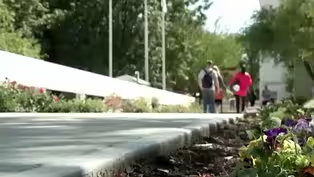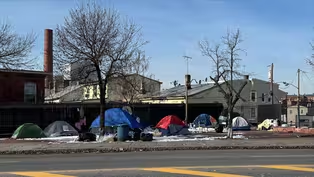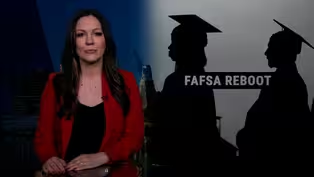NJ Spotlight News
NJ Spotlight News: December 27, 2024
12/27/2024 | 26m 46sVideo has Closed Captions
Watch as the NJ Spotlight News team breaks down today’s top stories.
We bring you what’s relevant and important in New Jersey news and our insight. Watch as the NJ Spotlight News team breaks down today’s top stories.
Problems playing video? | Closed Captioning Feedback
Problems playing video? | Closed Captioning Feedback
NJ Spotlight News is a local public television program presented by THIRTEEN PBS
NJ Spotlight News
NJ Spotlight News: December 27, 2024
12/27/2024 | 26m 46sVideo has Closed Captions
We bring you what’s relevant and important in New Jersey news and our insight. Watch as the NJ Spotlight News team breaks down today’s top stories.
Problems playing video? | Closed Captioning Feedback
How to Watch NJ Spotlight News
NJ Spotlight News is available to stream on pbs.org and the free PBS App, available on iPhone, Apple TV, Android TV, Android smartphones, Amazon Fire TV, Amazon Fire Tablet, Roku, Samsung Smart TV, and Vizio.
Providing Support for PBS.org
Learn Moreabout PBS online sponsorship>> Funding for NJ Spotlight News is provided by the members of the New Jersey Education Association.
Making public schools great for every child.
RWJBarnabas Health, let's be healthy together.
And Orsted, committed to delivering clean, reliable American-made energy.
Briana: Tonight, awaiting sentencing.
A judge is set to decide next month what the punishment for Bob Menendez's corruption conviction will be but the Former Senator is seeking another delay.
Patterson leaders consider a controversial ordinance to crack on homeless people sleeping in public.
>> Let's address this now before it becomes a bigger issue.
And we feel like if we prohibit camping in tents on public property can help us get some control over the situation.
Briana: A new law aims to protect young athletes from tragedy on the playing field.
>> We have an answer, we have hope.
We can save the children.
This is amazing.
Briana: And trotting to the finish.
One final weekend of racing in freehold signaling thae decline in free racing in New Jersey.
>> There is so much competition for the betting dollar nowadays that wagering at racetracks have gone down precipitously over the last two decades.
I think Freehold is the latest domino to fall.
Briana: NJ Spotlight News begins right now.
♪ >> From NJ PBS Studios, this is NJ Spotlight News with Briana Vannozzi.
Briana: Thank you for joining us on this Friday night.
We begin with a few of today's top headlines.
First, disgraced former Senator Bob Menendez is making one more attempt to have his January 29 sentencing delayed.
In a letter to federal judge Sidney Stein, his attorneys wrote his family would suffer a "tremendous emotional toll if he were sentenced during his wife's trial which is slated to start January 21."
Adding, the jury pool would likely be tainted because it would be hard to avoid news of Menendez's prison term.
Defense attorneys recommended moving the sentencing date to immediately after Nadine's trial which might not wrap up until March.
The former top Democrat resigned this summer after being found guilty of federal bribery and corruption charges.
His wife's trial was postponed so she could get treatment for her breast cancer diagnosis, but the request comes as Menendez awaits word on his third attempt to be granted a new trial due to errors made with evidence.
Also tonight, after years of failure in Congress, President Biden earlier this week signed into law the country's first anti-hazing legislation.
Stemming from the death of a Rider University student bedroom national attention more than 10 years ago after he died from hazing during fraternity initiation.
The new law will boost transparency and accountability on college campuses by disclosing to parents and students any hazing incidents that have been reported to authorities, and require schools to adopt stronger anti-hazing policies.
The family of Gary has been fighting for the law since 2007 after the 18-year-old freshman died from drinking nearly an entire bottle of vodka as part of an initiation ritual.
The family won a lawsuit against Rider University and two of its employees.
One student was sentenced to three years probation after pleading guilty to hazing, but the tragedies continued.
More recently, a student pledging for a Penn State fraternity died during a 2017 hazing incident.
Advocates are hoping the new law will keep more college kids safe.
Part of route 80 remains closed in Morris County thanks to a sinkhole that opened under the road on Thursday morning.
All of the interstate's eastbound lanes are closed in the area of exit 34, the intersection with Route 15.
The closure and detour were causing delays up to one hour as of this morning but the DOT says light holiday traffic has helped lessen the impact.
The sinkhole, about 40 feet across, because to the right lane to disappear.
The state Department of Transportation today said an abandoned mineshaft collapsed, creating the sinkhole.
The DOT is working to design and build an emergency fix but that work will be slowed by expected bad weather this weekend, and it's unclear how long the road will remain closed.
New federal data out today finds combating homelessness is a chronic nationwide problem with an 18% increase over last year, according to HUD.
There's a new push to address homelessness in Atlantic City with a first of its kind partnership between state and local authorities.
The Department of community affairs on Thursday announced a new collaboration with city government and local nonprofits to prevent homelessness by using three steps.
Strengthening outreach efforts, improving shelter access, and expanding housing stability programs.
That work will be in place over the next three years, but the Atlantic City announcement comes as other cities and towns in New Jersey are choosing to deal with homelessness in a different way.
By increasing penalties for people sleeping outside.
New ordinances that fine or threaten jail time for people sleeping in public spaces has been on the rise since a controversial Supreme Court decision upheld them as legal earlier this year.
Our Senior correspondent takes a look at Patterson where city leaders are considering rolling out that same rule.
>> We want to make it clear that camping in tents, on public property is not warranted here.
>> The mayor is in support of a new ordinance working through the Patterson city Council that would ban sleeping or setting up camps in public spaces and would penalize anyone who does.
He says homeless encampments are a major problem.
>> That obstructs the sidewalk.
We've got a lot of complaints that kids cannot get to school.
They have to walk over people, walk around the tent.
Our point is let's address this now before it becomes a bigger issue.
And we feel like if we prohibit camping in tents on public property can help us get some control over the situation.
>> The city Council voted 5-4 on the first reading of the ordinance last week that would issue up to $2000 in fines and 90 days jail sentences for those found camping in public.
We didn't find anyone obstructing the sidewalk today.
We did see them in places like these open plazas, sometimes under bridge embankments.
>> This was crafted looking at other city ordinances.
Since the Supreme Court decided a few months back that this was legal to do, we keep getting inquiries from all of you, from the community about these tents popping up all over.
We don't have a mechanism to hold these people accountable.
>> Earlier this year, the U.S. Supreme Court ruled allowing minister polities to penalize people for sleeping outdoors with fines, an even jail time.
Since that, some 100 towns across the country have passed similar ordinances.
>> We are really trying to work with folks in the legislature and in government to do everything we can to stand against that because it does make that work so much harder.
>> Rich runs bridges outreach that works to prevent and address homelessness.
He's opposed to these laws because he says it creates long-term ramifications that only worsen homelessness.
>> Finding and presenting a person for the experience of homelessness and the biologic imperative to sleep is not right.
How does that make any sense to treat a person that way?
They've got new fines that they are ill-equipped to pay.
Maybe new charges at a criminal record, which will be an additional barrier to their housing success.
>> He says pushing them from the locations makes it harder for outreach programs like his to reach them, and they often lose their identification in encampment sweeps.
He says his city is poised to help and that is what they want to do.
>> If there are individuals that are camping in these tents on public property that are struggling with drug addiction, we have a nationally recognized program.
Real Fix.
A million-dollar challenge for the city of Patterson for people to get treatment.
Have gotten 50 people in treatment.
>> I do understand the resources, but this is talk about arresting, fining, jailing.
>> There has to be a penalty, because quite frankly, if there isn't, there is not teeth to this law.
Like I stated before, I created a task force.
We will do the outreach.
>> Why not do the outreach now before it comes to arresting?
>> We do need an ordinance.
We have to prohibit the tents because if we say here are these programs and if people are service resistant, they would say why would I take advantage when I can stay here?
Plus, it is cold.
>> For this to have teeth, then he to know there's a consequence if you don't get into the program?
That is how you see it?
>> They should know we are here to help, we are not here to hurt anybody, but they cannot camp out on public property.
>> I think we are approaching it in a way that is punitive and is criminalizing, and not something that is going through a compassionate lens.
We have to be able to address the real issue, which is not homelessness, but the lack of affordable homes in the city.
>> That is an issue that will take more than a vote to fix.
For now, this ordinance is up for a final vote on January 21.
Briana: Each year, thousands of seemingly healthy young people in the U.S. die from an unexpected cause.
Sudden cardiac arrest.
A new law signed by President Biden this week known as the hearts Act is aimed at reducing the number and saving lives.
It will set aside federal money to pay for defibrillators and CPR training in schools and childcare centers.
As Ted Goldberg reports, the legislation was inspired by young New Jersey residents who died from sudden cardiac arrest including one student from Edison who collapsed and died at 17 during track practice from an undiagnosed heart condition.
>> We have an answer, we have hope.
We can save the children.
This is amazing.
Ted: Walker hopes the Hearts Act can help people suffering from sudden cardiac arrest something that led to the death of her grandson.
>> It has been 15 long years which even those long years, it feels like yesterday.
Ted: This mural honors the multisport star who appeared to be a perfectly healthy young man.
>> That is my baby, my everything.
What happened?
We watched him play football and try to make sure he had the right things, all of the, you know, exams and protocols.
He did all of those things.
How could this happen?
Ted: Unbeknownst to him or his family, he had hypertrophic cardiomyopathy, an undiagnosed heart condition, and went into cardiac arrest during track practice.
>> He was the strongest one in the family.
He was a football player.
It was strong.
He was looking to go to the NFL.
Ted: The Hearts Act stalled in Congress when introduced in years past.
This time, it got help across the finish line thanks to the very league he dreamed about playing for.
>> I worked very hard over the years to get this passed in the house, but the reason -- I won't say the only reason but the major why it passed the Senate was because he push for it.
Ted: He is Demar Hamlin, the NFL player who collapsed after an otherwise harmless looking tackle two seasons ago.
EMT's saved his life, thanks to their training in a readily available defibrillator.
>> The incident made him push for it and he played a major role in influencing the Senate.
>> There's nothing I can do to bring my son back here, but I can definitely do everything in my power to try to protect other children.
Ted: Joe Taylor's son died from the same heart condition as Shardo during a basketball game when he was 16.
Joann watched the Demar Hamlin game live and went through mixed emotions after his recovery sparked a national conversation about heart health.
>> They were doing everything they could to save his life and they were doing it textbook.
So, that made me so excited because I knew, I go he's going to be OK.
The other emotion though was why does it take this national event on TV to make people aware as a society we need to make sure that people are prepared to respond to a sudden cardiac arrest?
I got the other emotion again like, you know what?
I will take it.
If it moves us forward as a society, if it makes people take CPR classes, if it makes people feel more comfortable using an AED, then let's go with it.
Ted: The Hearts Act establishes a national grant program for schools to have defibrillators on site, and a great program for training for sudden cardiac arrest or CPR.
Walker hopes that help spread awareness.
>> I went to sleep crying, waking up with that word hypertrophic cardiomyopathy.
Something that not many people knew about.
>> Part of the problem is that this is a hidden disorder, if you will.
In other words, people -- hopefully, this change now because until now, a lot of people didn't realize this was happening.
Ted: For Walker, the passage of the law marks a significant milestone in your years of advocacy.
Since her grandson's death, she has frequently spoken about heart conditions and her hope that children's physicals will start including echocardiograms.
>> I will have to make sure that there will be no other family that will go through this experience and feel this type of pain.
I am going to get out there and do whatever I need to do.
Ted: This federal legislation is similar to New Jersey's law passed in 2012 mandating that schools have defibrillators on site.
Congressman Frank Pallone says the big help for New Jersey will be the federal funds made available, hopefully to help save the lives of people suffering from sudden cardiac arrest.
I'm Ted Goldberg, NJ Spotlight News.
Briana: After a dismal year for federal student aid, it appears FAFSA applications are mostly back on track.
The U.S. Department of Education says more than 1.5 million families have been able to file a form since enrollment opened November 21.
That is a major turnaround from last year when glitches to the rollout of a new version of the form trapped students in a computer nightmare, causing many to file more than three months late.
So far, the 2025-2026 school year appears to be off to a better start, but will it last?
We turn to her education and child welfare writer Hannah Gross for more.
Good to see you.
So, by all accounts, they looks like anyway, the form is up and running somewhat successfully.
What do you know, what can you tell us?
Hannah: Yes, the form launched on November 21 which was about 10 days before the target date of December 1.
Still lagging behind the traditional launch date of October 1 when students can normally start filling out federal financial aid forms.
Briana: Have there been any glitches?
What type of proactive measures has the Department of Ed taken to make sure the bungled rollout from last year does not hit another snag this year?
Hannah: So far, the Department of Education says everything is running smoothly.
They have added a lot of staff at their call centers, almost 1000 staff right now, which is part of the busiest time of year for people to fill it out because some said is awarded -- aid is awarded on a first-come, first-served basis.
Those staff members are available to answer questions in English and Spanish.
There's also translation available for other languages.
The call center has expanded hours from last year.
Briana: It was almost two months after the rollout was supposed to happen.
Has that impacted any students, particularly the students who need this funding the most?
Hannah: It is hard to say what the impact has been so far by about mid-December.
A few weeks after it opened, 1.5 million students filled out FAFSA, but it is not due until June 30 so it is hard to say what final completion numbers will be.
Although, students should fill it out as soon as they can to get access to aid.
Briana: What do you think based off all your reporting the biggest lessons were that were learned from really, essentially what was a failed, a failure in terms of rolling this out?
The simpler form?
Hannah: I think the federal government learned the importance of having that October 1 deadline so students can apply for aid early and find out all of the information they have available to them before deciding if they want to pursue college, where they want to go to college.
So, there was a bipartisan bill introduced that requires FAFSA to be posted and opened by October 1 each year.
Briana: So, how much of an impact did this have?
When we think back to all the stories you covered, how many students did not get to apply who needed to, who wanted to?
Do we have those type of metrics now?
Hannah: We do, and that is all in our reporting that is posted online.
The number of students who filled out FAFSA was down and Pell Grants, that was down as well because students didn't fill out the eight applications the same way they used to in the past.
Briana: By how much?
I believe it was quite a few.
Hannah: I think it was around 10%.
Briana: When we look at that -- he went to schools,, you talk to parents what type of real-life impacted that have?
Hannah: Some students were faced with the May 1 decision day to let colleges know whether they wanted to attend or not, and they didn't know how much college would cost them.
So, it is very difficult to sign on to attending college for one year or four years when maybe the price tag is tens of thousands of dollars if you were paying out-of-pocket and you don't know how much aid you will get from the federal government, from the state, or from the college or university you are interested in.
Briana: What did you expect for the year ahead in terms of this?
Were you able to get in touch with anyone from the Education Department to get their take?
Hannah: The Education Department spokes people are saying things are running smoothly this year.
One thing that is new in New Jersey is that high school seniors will be required to fill out FAFSA in order to graduate.
In the past, there have not been high rates of completion among New Jersey high schoolers.
So, schools will need to get those rates up if they want kids to be able to graduate and not be held back because of this requirement.
Briana: And get their counselors on board to help them.
You can check out all of the reporting on this on our website.
Hannah, good to see you.
Hannah: Thank you.
Briana: In our business report, an end of an era and a blow to the horse racing industry.
On Saturday, after 170 years, New Jersey's oldest racetrack will shut down for good.
Despite desperately trying to stay afloat, Freehold Raceway will hold 11 less races tomorrow before closing its doors permanently.
It is one of nearly 50 other racetracks around the country that have closed in the last few decades as interest in the sport declines in the popularity of other sports betting takes hold.
The Raceway has been a mainstay of the Freehold community since it opened in 1854 and its closure could signal something larger.
For more, I am joined by Steve, the New Jersey sports columnist for the USA today network.
Great to talk to you.
In the pieces you have road leading up to this, you spoke with quite a few longtime trainers, horsemen, the like.
What is the overall sentiment right now in the community about this closure?
Steve: I think there's a lot of sadness and a lot of uncertainty because there were so many lives that are impacted by so many families locally.
Whether you work directly at the racetrack or you were an ancillary employee or a horseman who has a farm and the horses run their.
The ripple effects are so far-reaching through the community, I think it is that uncertainty that everyone is trying to deal with right now.
Briana: Is this closure a reflection of a broader trend we are seeing?
A couple of our folks have been working on a piece.
They found that handlers at Freehold's dropped from over $5 million in 2018 to just over $2.8 million last year, so I significant decline.
Is that something we are seeing industrywide?
Is this the Canary?
Steve: Yeah, it certainly is.
There is so much competition for the betting dollar these days that racetrack handle, wagering at racetracks has gone really down precipitously over the last two decades.
I think Freehold is kind of the latest domino to fall unfortunately.
There are nearly 50 racetracks closed nationally since 2000.
This is the third New Jersey racetrack to close since 2001.
It really is an industry trend.
Betting is down everywhere.
Briana: Some of that have to do with the rise of online gambling?
There was also the casino debate that played into this closure.
Or is all of that just pieces of a much larger puzzle?
Steve: In the Freehold case, it is all pieces.
The owners have a 25 year plan to secure a casino in New Jersey.
I think they missed CAC laded how strong the Atlantic sit -- I think they miscalculated how strong the Atlantic City is in Trenton.
Yes, I think sports betting has come online.
Last year, sports betting nationally had a handle of $120 billion.
That is a big piece of the gambling pie.
So, it is a complicated relationship with a racetrack because the racetracks have a sports book and I think the operators of Monmouth Park in the Meadowlands will tell you sports betting is why they are open.
Yet, sports betting is taking a big piece of the gambling dollar as well.
Briana: It is a Catch-22.
I wonder what could the state, if anything, do to better support those tracks, Monmouth Meadowlands, that you just mentioned that her remaining?
Steve: It is interesting because Freehold announced it was closing seven days after Governor Murphy signed legislation that would extend the $20 million annual purse subsidies for the racing industry through 2029.
It is a fair question to wonder are they really working?
That is one way that certainly the state has stepped up to try to help the racing industry.
They have also proved development at Monmouth Park, 80 acres of state owned land, in an attempt to provide a long-term revenue stream for Monmouth Park to keep that alive.
There are certain things they are doing, but there's only so much in this economic climate they will be able to do.
Briana: Based off of that, based off the reporting you've done, do you think there is a space for revitalization of this industry, or are we headed towards a permanent decline?
Steve: I think it is certainly going in this direction.
It does not seem to be reversing anywhere.
I think in terms of Freehold, there are options on the table in terms of redevelopment.
That would include horseracing.
But while they have a nice vision for that, you need money.
We will see if anybody steps up And I am certain that developers in terms of housing and retail will be very interested in the property.
Briana: 170 years comes to a close tomorrow.
Steve Edelson, thank you so much.
That will do it for us tonight but before we go, a reminder to download the NJ Spotlight News podcast so you can listen to us anytime.
I'm Briana Vannozzi.
For the entire team, thank you for being with us tonight.
We will see you on Monday.
>> NJM insurance group, serving the insurance needs of residents and businesses for more than 100 years.
New Jersey realtors, the voice of real estate in New Jersey.
More information is online.
And the PSEG foundation.
♪ ♪
Biden signs groundbreaking federal anti-hazing legislation
Video has Closed Captions
Clip: 12/27/2024 | 1m 19s | The law comes after years of advocacy from families like that of Gary Devercelly (1m 19s)
Freehold Raceway holds its final races after 170 years
Video has Closed Captions
Clip: 12/27/2024 | 5m 25s | Interview: Stephen Edelson, sports columnist, Asbury Park Press (5m 25s)
New law to provide defibrillators, CPR training for schools
Video has Closed Captions
Clip: 12/27/2024 | 5m 10s | Rep. Frank Pallone credits Damar Hamlin for helping push legislation across finish line (5m 10s)
Paterson proposes ordinance to penalize homeless encampments
Video has Closed Captions
Clip: 12/27/2024 | 4m 38s | Critics say ordinance does not resolve the issue, will worsen homelessness (4m 38s)
What to know for the FAFSA application process
Video has Closed Captions
Clip: 12/27/2024 | 5m 11s | Interview: Hannah Gross, education and child welfare writer, NJ Spotlight News (5m 11s)
Providing Support for PBS.org
Learn Moreabout PBS online sponsorship
- News and Public Affairs

Top journalists deliver compelling original analysis of the hour's headlines.

- News and Public Affairs

FRONTLINE is investigative journalism that questions, explains and changes our world.












Support for PBS provided by:
NJ Spotlight News is a local public television program presented by THIRTEEN PBS




